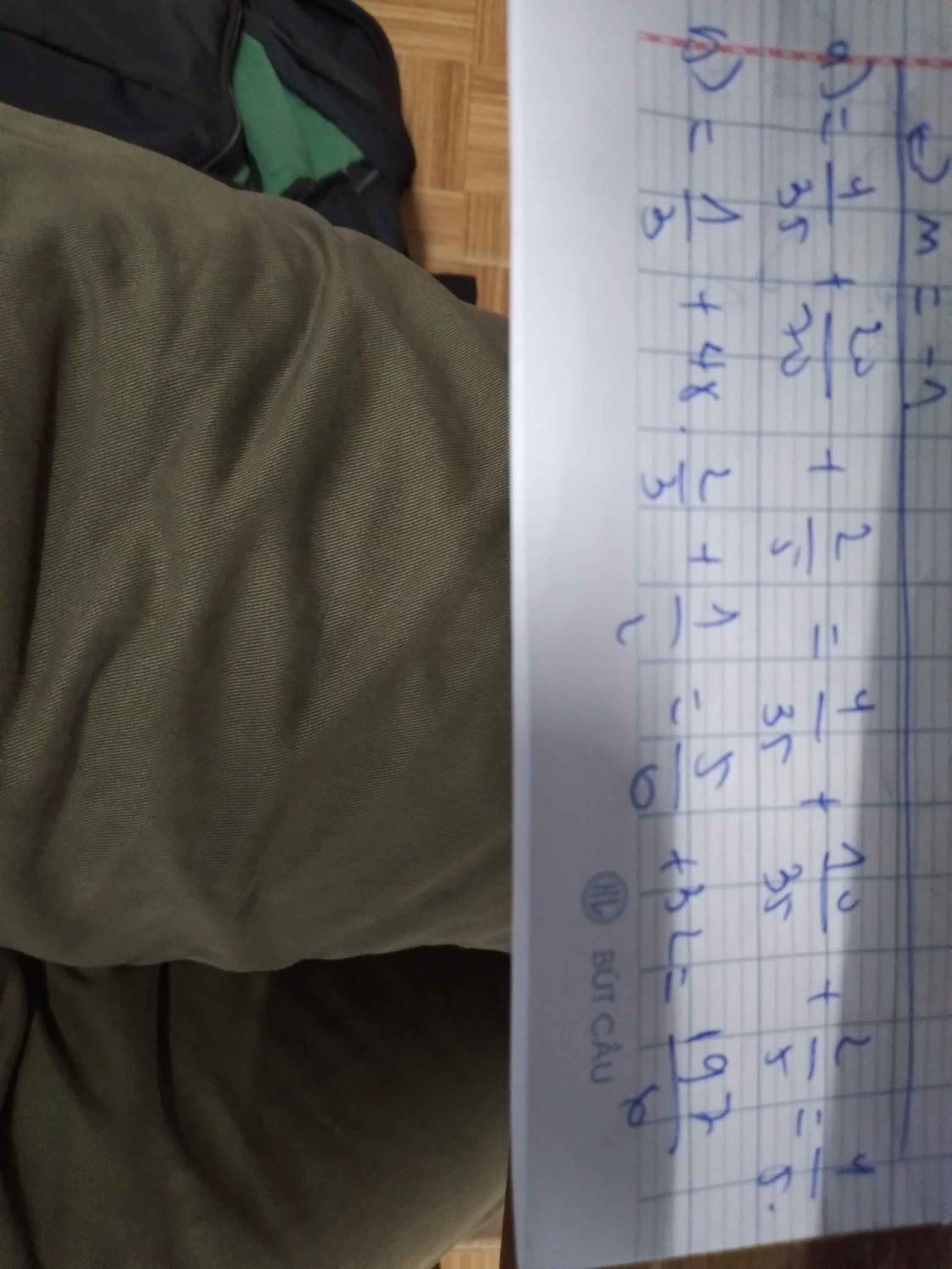2x2-5x-7

Những câu hỏi liên quan
Giups nào
Câu 1: Tập nghiệm của bất phương trình :–2x2+5x+7≤0–2x2+5x+7≤0 là :
A. S=(–∞;–1]∪[72;+∞)S=(–∞;–1]∪[72;+∞)
B. (–1;72)(–1;72)
C. [–1;72][–1;72]
D. S=(–∞;–1)∪(72;+∞)
Giải phương trình chứa ẩn ở mẫu sau:
1
2
x
2
+
5
x
−
7
−
2
x
2
−
1
3
2
x
2
−
5
x
−...
Đọc tiếp
Giải phương trình chứa ẩn ở mẫu sau:
1 2 x 2 + 5 x − 7 − 2 x 2 − 1 = 3 2 x 2 − 5 x − 7
2x2+5x-1<=7\(\sqrt{x^3-1}\)
giải bất phương trình
`Answer:`
ĐK: `x^3-1>=0`
`<=>(x-1)(x^2+x+1)>0`
`<=>x>=1`
PT tương đương: `2.(x^2+x+1)+3(x-1)=7\sqrt{(x^2+x+1)(x-1)}`
Đặt `a=\sqrt{x^2+x+1}<=>a^2=x^2+x+1;b=\sqrt{x-1}<=>b^2=x-1`
PT tương đương: `2a^2+3b^2=7ab`
`<=>2a^2-7ab+3b^2=0`
`<=>2a^2-ab-6ab+3b^2=0`
`<=>a(2a-b)-3b(2a-1)=0`
`<=>(2a-b)(a-3b)=0`
`<=>2a=b` hoặc `a=3b`
Với `2a=b:`
`2\sqrt{x^2+x+1}=3\sqrt{x-1}`
`<=>4(x^2+x+1)=9(x-1)`
`<=>4x^2-5x+13=0`
`\Delta=5^2-4.4.13<0`
Vậy phương trình vô nghiệm.
Với `a=3b:`
`\sqrt{x^2+x+1}=3\sqrt{x-1}`
`<=>x^2+x+1=9(x-1)`
`<=>x^2-8x+10=0`
`\Delta'=4^2-10=6`
`<=>x=4+-\sqrt{6}`
Vậy phương trình cố nghiệm là `x=4+-\sqrt{6}`
`
giải phương trình : 2x2-5\(\sqrt{x^2_{ }-5x+7}\) =10x-17
2\(x^2\) - 5 \(\sqrt{x^2-5x+7}\) = 10\(x\) - 17 Đk \(x^2\) - 5\(x\) + 7 ≥ 0
\(x^2\) - 2.\(\dfrac{5}{2}\)\(x\) + \(\dfrac{25}{4}\) + \(\dfrac{3}{4}\) = (\(x\) - \(\dfrac{5}{2}\))2 + \(\dfrac{3}{4}\) > 0 ∀ \(x\)
ta có: 2\(x^2\) - 5\(\sqrt{x^2-5x+7}\) = 10\(x\) - 17
2\(x^2\) - 5\(\sqrt{x^2-5x+7}\) - 10\(x\) + 17 = 0
(2\(x^2\) - 10\(x\) + 14) - 5\(\sqrt{x^2-5x+7}\) + 3 = 0
2.(\(x^2\) - 5\(x\) + 7) - 5.\(\sqrt{x^2-5x+7}\) + 3 = 0
Đặt \(\sqrt{x^2-5x+7}\) = y > 0 ta có:
2y2 - 5y + 3 = 0
2 + (-5) + 3 = 0
⇒ y1= 1; y2 = \(\dfrac{3}{2}\)
TH1 y = 1 ⇒ \(\sqrt{x^2-5x+7}\) = 1
⇒ \(x^2\) - 5\(x\) + 7 = 1
\(x^2\) - 5\(x\) + 6 = 0
\(\Delta\) = 25 - 24 = 49
\(x_1\) = \(\dfrac{-\left(-5\right)+\sqrt{1}}{2}\) = 3;
\(x_2\) = \(\dfrac{-\left(-5\right)-\sqrt{1}}{2}\) = 2;
TH2 y = \(\dfrac{3}{2}\)
\(\sqrt{x^2-5x+7}\) = \(\dfrac{3}{2}\)
\(x^2\) - 5\(x\) + 7 = \(\dfrac{9}{4}\)
4\(x^2\) - 20\(x\) + 28 = 9
4\(x^2\) - 20\(x\) + 19 = 0
\(\Delta'\) = 102 - 4.19
\(\Delta'\) = 24
\(x_1\) = \(\dfrac{-\left(-10\right)+\sqrt{24}}{4}\) = \(\dfrac{10+\sqrt{24}}{4}\)
\(x_2\) = \(\dfrac{-\left(-10\right)-\sqrt{24}}{4}\) = \(\dfrac{10-\sqrt{24}}{4}\)
8 - 5\(\sqrt{6}\)
Từ các lập luận trên kết luận phương trình có tập nghiệm là:
S = {8 - 5\(\sqrt{6}\); 2 ; 3; 8 + 5\(\sqrt{6}\)}
Đúng 0
Bình luận (0)
2 - 5 = 10 - 17 Đk - 5 + 7 ≥ 0
- 2. + + = ( - )2 + > 0 ∀
ta có: 2 - 5 = 10 - 17
2 - 5 - 10 + 17 = 0
(2 - 10 + 14) - 5 + 3 = 0
2.( - 5 + 7) - 5. + 3 = 0
Đặt = y > 0 ta có:
2y2 - 5y + 3 = 0
2 + (-5) + 3 = 0
⇒ y1= 1; y2 =
TH1 y = 1 ⇒ = 1
⇒ - 5 + 7 = 1
- 5 + 6 = 0
= 25 - 24 = 49
= = 3;
= = 2;
TH2 y =
=
- 5 + 7 =
4 - 20 + 28 = 9
4 - 20 + 19 = 0
= 102 - 4.19
= 24
= =
= =
8 - 5
Từ các lập luận trên kết luận phương trình có tập nghiệm là:
S = {8 - 5; 2 ; 3; 8 + 5}
Đúng 0
Bình luận (0)
Giúp vs ạBài 1 giải các bất phương trình saua.x2 - x - 6 0b.2x2 - 7x + 5 0c.3x2 - 9x + 6 ≥ 0d.2x2 - 5x + 3 0Bài 2 Giải phương trình sauA.√x2 + x + 5 √2x2 - 4x + 1B.√11x2 -14x - 12 √3x2 + 4x - 7
Đọc tiếp
Giúp vs ạ
Bài 1 giải các bất phương trình sau
a.x2 - x - 6 = 0
b.2x2 - 7x + 5 < 0
c.3x2 - 9x + 6 ≥ 0
d.2x2 - 5x + 3 < 0
Bài 2 Giải phương trình sau
A.√x2 + x + 5 = √2x2 - 4x + 1
B.√11x2 -14x - 12 = √3x2 + 4x - 7
Bài 2:
a: =>2x^2-4x+1=x^2+x+5
=>x^2-5x-4=0
=>\(x=\dfrac{5\pm\sqrt{41}}{2}\)
b: =>11x^2-14x-12=3x^2+4x-7
=>8x^2-18x-5=0
=>x=5/2 hoặc x=-1/4
Đúng 0
Bình luận (0)
Thực hiện phép tính:
a) (5x-4y3).(2x2-1+y)
b) (x-3).(2x-1)-(2x-7).x
a) \(\left(5x-4y^3\right)\left(2x^2-1+y\right)=10x^3-5x+5xy-8x^2y^3+4y^3-4y^4=-4y^4+10x^3+4y^3-8x^2y^3+5xy-5x\)
b) \(\left(x-3\right)\left(2x-1\right)-\left(2x-7\right)x=2x^2-7x+3-2x^2+7x=3\)
Đúng 1
Bình luận (0)
\(a,=10^3-5x+5xy-8y^3x^2+4y^3-4y^4\\ b,=3\)
tick mik nha
Đúng 1
Bình luận (0)
a: \(\left(5x-4y^3\right)\left(2x^2+y-1\right)\)
\(=10x^2+5xy-5x-8x^2y^3-4y^4+4y^3\)
b: \(\left(x-3\right)\left(2x-1\right)-x\left(2x-7\right)\)
\(=2x^2-x-6x+3-2x^2+7x\)
=3
Đúng 0
Bình luận (0)
Tính
1. ( - 4xy ) . ( 2xy2 - 3x2y)
2. ( -5x ) ( 3x3 + 7x2 - x )
3. ( 3x - 2 ) ( 4x + 5 ) - 6x ( 2x -1 )
4. 2x2 ( x2 - 7x + 9 )
5. ( 3x - 5 ) ( x2 - 5x + 7 )
`@` `\text {Ans}`
`\downarrow`
`1.`
\(\left(-4xy\right)\cdot\left(2xy^2-3x^2y\right)\)
`=`\(\left(-4xy\right)\left(2xy^2\right)+\left(-4xy\right)\left(-3x^2y\right)\)
`=`\(-8\left(x\cdot x\right)\left(y\cdot y^2\right)+12\left(x\cdot x^2\right)\left(y\cdot y\right)\)
`=`\(-8x^2y^3+12x^3y^2\)
`2.`
\(\left(-5x\right)\left(3x^3+7x^2-x\right)\)
`=`\(\left(-5x\right)\left(3x^3\right)+\left(-5x\right)\left(7x^2\right)+\left(-5x\right)\left(-x\right)\)
`=`\(-15x^4-35x^3+5x^2\)
`3.`
\(\left(3x-2\right)\left(4x+5\right)-6x\left(2x-1\right)\)
`=`\(3x\left(4x+5\right)-2\left(4x+5\right)-12x^2+6x\)
`=`\(12x^2+15x-8x-10-12x^2+6x\)
`=`\(\left(12x^2-12x^2\right)+\left(15x-8x+6x\right)-10\)
`=`\(13x-10\)
`4.`
\(2x^2\left(x^2-7x+9\right)\)
`=`\(2x^2\cdot x^2+2x^2\cdot\left(-7x\right)+2x^2\cdot9\)
`=`\(2x^4-14x^3+18x^2\)
`5.`
\(\left(3x-5\right)\left(x^2-5x+7\right)\)
`=`\(3x\left(x^2-5x+7\right)-5\left(x^2-5x+7\right)\)
`=`\(3x^3-15x^2+21x-5x^2+25x-35\)
`=`\(3x^3-20x^2+46x-35\)
Đúng 4
Bình luận (0)
Tìm giá trị nhỏ nhất của biểu thức:
1. x2-2x-5
2. 3x2+5x-2
3. 2x2-7x+7
1: Ta có: \(x^2-2x-5\)
\(=x^2-2x+1-6\)
\(=\left(x-1\right)^2-6\ge-6\forall x\)
Dấu '=' xảy ra khi x=1
2: ta có: \(3x^2+5x-2\)
\(=3\left(x^2+\dfrac{5}{3}x-\dfrac{2}{3}\right)\)
\(=3\left(x^2+2\cdot x\cdot\dfrac{5}{6}+\dfrac{25}{36}-\dfrac{49}{36}\right)\)
\(=3\left(x+\dfrac{5}{6}\right)^2-\dfrac{49}{12}\ge-\dfrac{49}{12}\forall x\)
Dấu '=' xảy ra khi \(x=-\dfrac{5}{6}\)
Đúng 0
Bình luận (0)
Kết quả phép tính nhân (2x+1).(x-3) là:
A.2x2+7x-3
B.2x2-5x-3
C.2x2-3
D.x2-5x-2
\(=2x.x-2x.3+x-3\\ =2x^2-6x+x-3\\ =2x^2-5x-3\)
=> Chọn B
Đúng 0
Bình luận (0)
tính bằng cách thuận tiện nhất:
a) 2/5x 2/7+4/10x5/7+6/15.
b) 1/2x2/3+48: 3/2+9/18



























